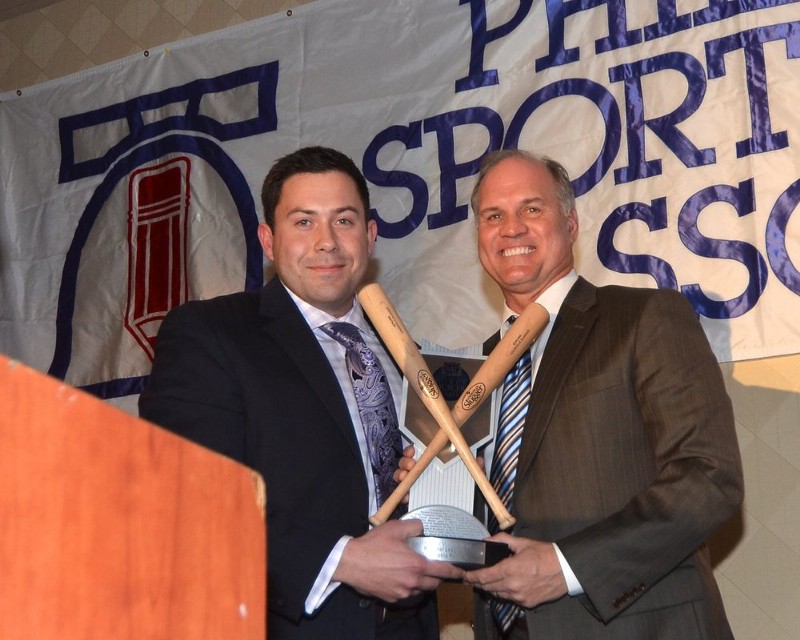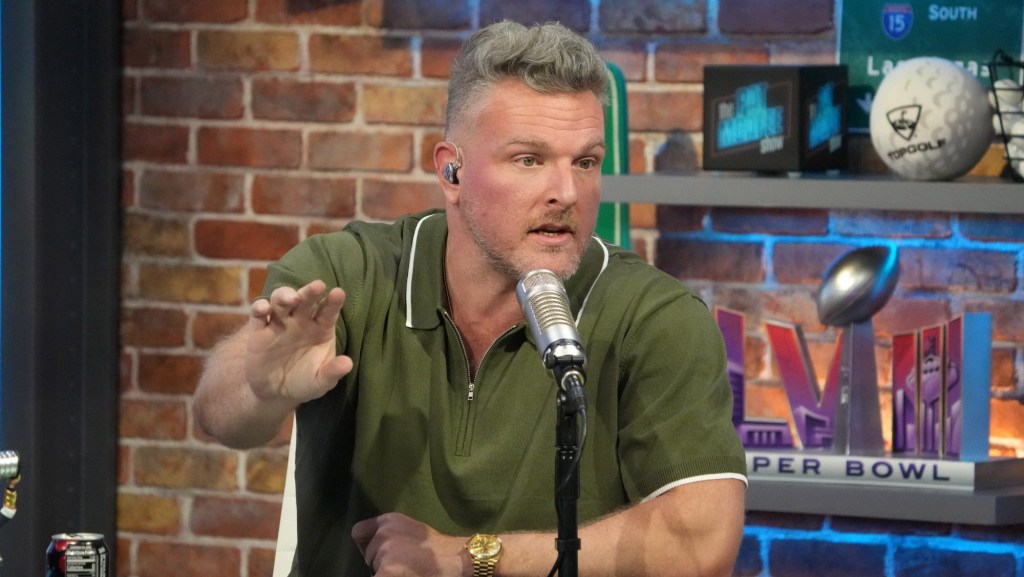By: Adam White, @FOSAdam

Front Office Sports is proud to have sat down with Erik Nilsen, Director of the Baseball Assistance Team (B.A.T) at Major League Baseball. Erik is a graduate of the York College of Pennsylvania where he majored in Sports Management and was a catcher for the baseball team. Erik has taken his practical knowledge and competitive nature and turned it into a successful sports career spanning 12 years. With stops at the Hudson Valley Renegades, the New York Mets and Major League Baseball, Erik has worked his way up through the levels of baseball and experienced everything from running a scoreboard to providing a safety net for former players and their families. He was gracious enough to offer up his time and insight into what, in his mind, is “MLB’s best kept secret”, how tough entry-level positions can be and why, in sports, you can’t take anything for granted.
You have been in baseball most of your career. What has that journey been like? What have you found so appealing that has made you stay throughout your career?
Reflecting on his collegiate days he said, “I played baseball at the collegiate level at a small school in Pennsylvania where I was a catcher. My goal in life was that if I couldn’t play professional baseball, I might as well work in it.” Although his first job wasn’t his dream job, it gave him get some great experience saying, “My first job was as an intern for the Hudson Valley Renegades as a scoreboard operator. It was an interesting position because it was fun to learn the ins and outs of minor league baseball.” After working in minor league baseball for a bit, he landed a position at Positive Impact selling mostly Seton Hall basketball ticket packages as well as doing some promotions for the Army Black Knights Men’s Ice Hockey team. During that time, a Mets ticket sales job opened up and, since working in baseball was my dream, I went for it. The pay was bad, but I’ve been in baseball ever since so it worked out for me.”
Although it wasn’t where he ended up, he is enjoying everyday of it saying, “I didn’t envision working in a non-profit, but it’s all about hard work and perseverance. Sometimes your career takes unexpected turns.”
He loves working where he does because, for him, it’s a position not many know about and because it offers an interesting perspective on the interworking aspects of the MLB.
When speaking about the purpose of B.A.T it was evident he was very happy with the work they do saying, “B.A.T has been around since 1986 and takes care of members of the Baseball Family who are in need of assistance with nowhere else to turn. B.A.T. deals with a number of situations that span from keeping a roof over a families head, food on the table, the electric turned on, addiction/recovery, suicide prevention and in some instances even help bury a loved one. It’s all made possible by current players and the contributions they give each spring.”
To many in MLB, the employees for B.A.T. work in “baseballs best kept secret.” To him, B.A.T is a great safety net for players (MLB & MiLB), umpires, scouts, negro league players, athletic trainers, managers, coaches, Major and Minor League Front Office personnel, women from the Professional Baseball League and the widows and children (under the age of 23) that not many organizations have.
The organization is a way for current players to give back to those who came before them as B.A.T gets a majority of it’s funding from the players. MLB pays for the office overhead and every other dollar that comes through B.A.T goes directly to someone in need. “Our main fundraiser is the annual B.A.T. Spring Training Fundraising Tour where we solicit the 30 teams in both Florida and Arizona for contributions. We distribute payroll deduction forms and players indicate the amount they want withheld from each paycheck to go to B.A.T.”
What was your entry-level position like? Can you share your experience on what students should expect going in?
Speaking highly of his entry-level position he said, “The one entry-level position I was at the longest was when I was a telemarketing ticket sales representative for the Mets.”
He also recognized how hard the work was saying, “I was driving two hours to work and two hours back home. I was working from 9:00 a.m. to almost midnight and I was making $6.50 an hour. We also made a 5% commission on our sales. The first day I was there they gave me call sheet with 100 leads on it and told us to get on the phone and start selling. We made between 100–150 phone calls a day. This was back in 2004 when the Mets weren’t so good, so you can imagine how hard it was to sell.”
For Erik, the hard work was great and made him strive to reach his goals even more saying; “I give credit to my background in sports. I was very competitive on the playing field, which translated into the office competing with the other telemarketers. Out of the 12 guys, I finished fourth in sales. I did that for six months and was basically working to pay for my gas and tolls while living in my parents house. I had no life at all during the week and spent my weekends catching up on sleep.”
All the hard work paid off. I left a great impression during my time there and I proceeded to get interviewed for a group sales job. Eventually, I got that job. It was so much fun because I also planned events and was actually the first to plan “Polish Night” at Shea Stadium.
For Erik, the key to any entry-level position is to bust your tail, make an impact, learn the trade and make yourself well rounded.
In the end, “What kept me motivated was my drive to not let myself down.”
In hindsight, what advice would you give to a younger Erik?
He was adamant about the insight he would give himself saying, “I would tell myself it’s all going to be worth it in the end. There were times when I was frustrated with where my career was heading. I was very impatient when it came to promotions or applying for other positions. Hard work does pay off. Approach every day with a mindset of giving it your best effort. Network with as many people as possible and give it all you can. If you do all of the above, you’ll live your life and career with no regrets.”
What is one of the key lessons you have learned while working in sports?
“The one thing I have seen the most is people taking their positions for granted. Because of that, I learned, never take anything for granted. Don’t be stagnant. Always be on the lookout for the next big thing and help as many people as you possibly can along the way.
He is a true proponent of networking saying, “Networking has been a huge key for me and social media has helped me with that immensely. You never know when you may have a question for a particular individual or when you’ll be looking for a position in their organization.”
Like many others in sports industry, he stresses that you must be a sponge and learn as much as you possibly can. “There are many different positions and organizations out there, there are many different egos, and there are many different supervisors. Soak up the good things and bad things and take it with you.”
“You learn from every single conversation you have.”
“You have to treat people well and let them grow. Its not all about making your employees work 9–5. As a boss, you want to cultivate their career and help them make a difference.”
What does your current position mean to you? Is it something you had your eyes set on?
For him this wasn’t a position he sought out, but one he is happy with where he is saying, “I didn’t always have my eyes set on it because, when I was with the Mets, I had no idea what B.A.T was. Once I got into B.A.T, I knew this was a position that I definitely wanted. With B.A.T, not only are you working as part of the MLB, you are helping people everyday. It’s a great feeling knowing that I am making a difference in someone’s life.”
“The best thing is that we have the full support of MLB. Adam Jones, Randy Winn, Steve Garvey, Bob Watson & Luis Gonzalez are big name players on our Board of Directors and, through MLB, we have the opportunity to go in to the clubhouses and thank the current day players for what they do for us and remind them that we are in the helping business.”
Parting Wisdom?
“Volunteer as much as possible. I wish I had volunteered more when I was in school because I would have set myself up better with the experiences gained. It could have made a world of difference.”
“Network as much as possible.”
“Reach out to professionals. Everyone loves to pass along advice and everyone is receptive to speaking with college students. You can get great advice for free. You just have to ask.”
“Be open to different opportunities.”
“Don’t burn any bridges, because you never know whom you are going to run into.”
We would like to thank Erik for his time and insight! You can follow him on Twitter here or connect with him on LinkedIn here!
If you would like to learn more about B.A.T check out these links!
https://www.sfgate.com/sports/shea/article/Randy-Winn-volunteers-to-help-baseball-people-in-6126432.php
https://www.sfgate.com/sports/shea/article/Randy-Winn-volunteers-to-help-baseball-people-in-6126432.php
https://www.kpho.com/Clip/11220491/little-slugger-saved-by-heart-surgery#.VQBD5ycaaoc.facebook
















